Record number of small grants received in 2019

This year we have seen a record number of applications for our small grants programme.
The purpose of our grants is to enable early career researchers and professionals in the field of tropical medicine or global health to undertake clinical or scientific research or fieldwork, as stand-alone projects or distinct elements within larger projects.
The grants can be up to £5,000 (including VAT) and can be used for travel, accommodation, consumables, field expenses, including salaries or per diems and transport, as well as items of equipment or software.
Availability of alternative funding
Our members and our own research suggest that our grants are quite unique for their accessibility, amount, flexibility and target audience. For researchers early in their careers who have an idea or concept they would like to test out, these grants can be a useful help up to the next stage of funding.
Those that have benefitted from a small grant in the past have referred to them as helpful in identifying the aspect of research they wanted to pursue. This year 78% of applicants told us they would not have been able to apply for similar funding elsewhere.
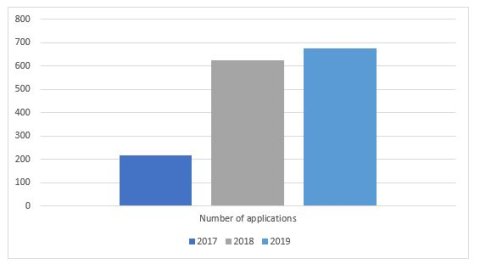
Growth in numbers of applications
The small grants programme has grown consistently in the last three years, increasing from just over 200 in 2017 to 674 this year, 2019. This is partly due to our increasingly broad network of volunteers, partners and organisations, and also from the reach we are now able to deliver through social media and other communications channels.
However we also feel this demonstrates the growing demand for this type of award, and popularity of the programme.
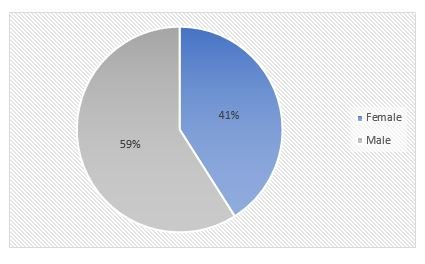
Gender balance
This year, we have seen a fairly even number of male and female applicants, which has been a feature of the grants progamme for a few years. Anecdotally, we understand that this gender split is quite unusual for grants across the board. This is not something we have carried out extensive research on, but we hope that our small grants provide great opportunity for all researchers and professionals early in their careers to be able to take their first step towards innovation.
This also helps us to move towards one of the objectives of our current strategy, which is to continue to improve diversity through our membership and all aspects of our work.
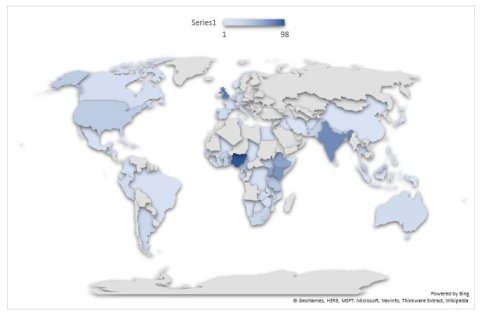
Countries where researchers are based
Our researchers are based across the world in more than 70 countries, which compares to 52 last year. This reflects the outreach we have carried out through our members and events.
We have many hundreds of volunteers supporting us around the world, including a number of Student Ambassadors who ensure their peers and networks are aware of opportunities like this.
Below you can see a snapshot of the geographical diversity.
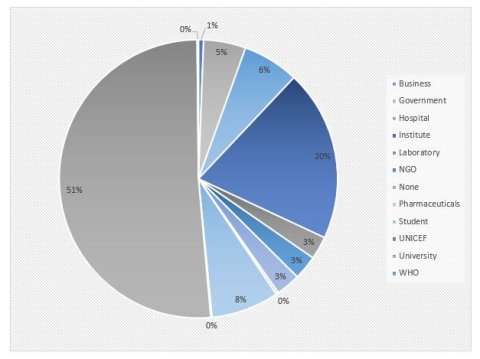
Sectors represented
The applications are from individuals across a wide range of sectors, including academia, clinical practice, health work, NGOs, industry and others. This diversity reflects our interest in ensuring the outcomes of our work are reflective of all sectors working in the tropical medicine and global health community and provide the best chance for us to achieve impact. In our current strategy we are making great efforts to establish more partnerships with organisations across sectors and regions of the world.
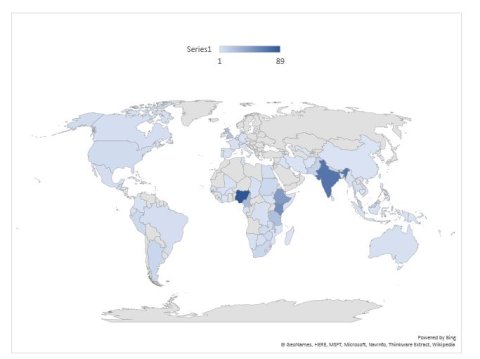
Countries where research is being carried out
This year sees even greater diversity of where research is being carried out, as evidenced by the map below.
The most popular research sites are in Nigeria and India, and there are high numbers of projects planned in eastern and southern Africa.
Looking globally, there are low numbers of applications or gaps in parts of western Africa, Latin and Central America and across much of Asia, which is something we will look further into for future years and for our wider work.
Disease areas being researched
The areas of research being investigated compares well to last year with a whole range of topics within infectious and non-communicable diseases. Notable popular topics include malaria, with 93 applications, which was also the most frequent research topic chosen last year.
However, we have also seen a rise in other thematic areas from last year, including a fairly high number of people researching AMR (31), which is one of the priorities of our strategy.
This grants round also produced applications in areas we have a particular interest in, such as snakebite (13) and mycetoma (4), which we didn't see last year. We hope this reflects our direct interest and awareness raising in these areas. These are two areas which we will continue to be involved in for the coming months.
A first brief analysis shows that, overall, there were around 170 topics covered through the applications. You can download a list of the topics here.
Huge demand
As was the case last year, and previously, the demand for our small grants greatly outstrips the amount we can fund.
As an example, last year our network of Global Assessors identified around 150 from the 624 applications that were of high enough quality to be funded. Unfortunately, we only had the funds to award 16 grants.
Our ambition is that all the high-quality pieces of research can be funded, so that early career researchers have the opportunity to pursue their ideas and can establish whether there is enough evidence to continue their research or take their ideas in a new direction.
We want these grants to be able to help identify the next diagnostics and drugs, the optimal patient pathways or health systems innovations, which could be the first steps towards our vision of improving and saving lives.
New partnerships
This year we have seen interest from partners in helping support more of the small grants. A few weeks ago, we announced our new partnership with ITI. They have committed to funding four selected small grants of up to £5,000 each to support trachoma research. On a first analysis, we received a total of 19 trachoma applications.
If you would like to contribute towards us funding more small grants, or nominate an organisation you know who may be interested to learn more about this process, please tamar [dot] ghosh [at] rstmh [dot] org (email me).
Next steps
In the next few months we will assess the small grants and by July we aim to issue them.
Please watch this space for further analysis on the programme as we start to see the results of previous grantees’ work.
Sign up to our newsletter for more updates

